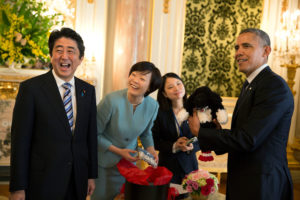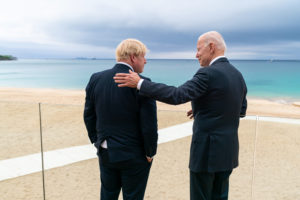Shinzo Abe’s and Boris Johnson’s respective ties to Westchester and Fairfield

The shocking assassination of former Japanese Prime Minister ShinzÅ Abe has reminded us of our encounter with his lovely widow, Akie. In October of 2017, the Japanese first lady and Masako Takahashi, wife of Reiichiro Takahashi, then the consul general of Japan in New York, visited Girl Again, a White Plains shop in which young women on the autism spectrum refurbish and sell donated, used American Girl dolls as part of the nonprofit Yes, She Can, founded by former IBM-er Marjorie Madfis. (Neither the nonprofit nor the shop is affiliated with American Girl.)
What we remember most is the way Akie Abe ”“ a progressive champion of minorities, including those on the spectrum ”“ leaned in, watching and listening intently to the workers. She insisted on paying full price for one of the dolls ”“ Jess, the Girl of the Year doll in 2006 ”“ whose backstory is of a Japanese-Scottish girl interested in environmental issues. Our hearts go out to Abe.

Boris Johnson”™s Fairfield County ties began with his birth on Manhattan”™s Upper East Side in 1964 when his father was studying economics at Columbia University. Though the family returned to England, they were back in the United States for the father”™s economics work in the 1960s, living in Norwalk in 1967 and ”™68.
For years Johnson ”“ a lame duck thanks to his recent resignation amid a cluster of controversies ”“ held dual British American citizenship. In 2014, he was forced to pay capital gains taxes to the American government on a British property he inherited. A year later, he renounced his American citizenship to demonstrate his loyalty to the United Kingdom. Or did he figure that taxation was too high a price for representation?